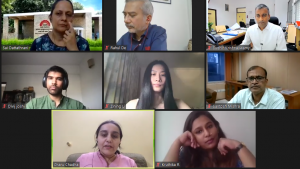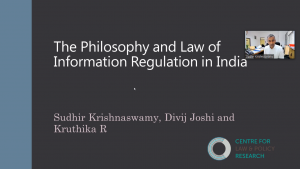
On July 8th, the Center for Law and Policy Research (CLPR) and the Indian Institute of Management, Bangalore (IIMB) co-hosted a webinar: ‘Ethics in AI Talk Series: A Conversation on Information Regulation, Artificial Intelligence, and Governance’. The webinar presented research from CLPR’s ‘Public Law of Information in India’ and IIMB’s ‘AI and Personhood Ethics’ projects.
Rahul De (Professor of Information Systems) began with IIMB’s research. His project is titled ‘Ethical Implications of delegating the decision-making journey to autonomous (AI) systems: Beyond the trolley problem’. De presented data from a field study involving a Thermal Imaging Camera. He highlighted the importance of ensuring that images are accurate during the screening process, an important consideration in building AI systems. Ethically, he stressed that an AI system is not completely objective, but is influenced by the will of its designer and the company for which it works. So, for the purpose of accountability, an AI’s ‘agency’ is not predetermined.

Next, Prof. Sudhir Krishnaswamy presented the outcomes of CLPR’s research project: ‘The Philosophy and Law of Information in India.’ He discussed the lack of data protection, and the importance of a strong legal and regulatory framework. And stated that CLPR has been working on an open access book, blog posts, and podcasts centred on this subject.
Divij Joshi presented three papers on the theme of Information Infrastructure and Law, examining how legal institutions and standards shape and are shaped by emerging infrastructures. In the first paper, Naveen Thayyil and Nishita Bharti critiqued India’s emerging digital health policy. In Allison and Brad Sherman’s paper, they examine how India’s information infrastructure for enforcing the Nagoya Protocol was developed and shaped by a particular view of international law of bioculture. The third paper by Smriti Parsheera, Vishal Trehan and Trishee Goyal, examines how Jio’s rise is reshaping the telecom market and information control in India.
Professor Sudhir Krishnaswamy spoke on the subject of Political Economy of Information Law. This section discussed the political and economic values that influence Indian information regulation and policy. Gunjan Chawla’s paper examines the enforcement of public disclosure laws empirically through shifting ideas of confidentiality and how it can inform norms of cyber security. Arindrajit Basu’s paper analyses the geopolitics of governing globalised network infrastructures such as the internet and the way the Indian government has approached data governance while considering sovereignty in global trade and security concerns. Third, a paper by Vibodh Parthasarathi examines audience enumeration policies and standards in both legacy media (TV and radio) and new media systems.
Kruthika R spoke about the third section on the Constitutional and Legal Foundations of Information Regulation. It considers the implications of information regulation for public law. The first paper by Abhishek Gupta, Ameen, Jauhar, and Nga Than, who conducted an empirical study of user privacy expectations on social media platforms and the implications for India’s data protection and privacy law debates. Sudhir Krishnaswamy’s paper takes a holistic view of the Indian legal system’s engagements with information regulation, spanning the history of information law and jurisprudence from media freedom to the right to information, and the more recent shift toward informational privacy. Then, she discussed her and Divij Joshi’s paper which examines how the use of data-driven decision making and algorithmic information technologies raise fundamental constitutional concerns about administrative decision-making. Finally, she discussed Jayna Kothari’s paper, in which she analyses the implications of information systems for the rights to equality and non-discrimination.
Emillie Pradachit from Thailand’s ‘Manushya Foundation’, in response, discussed the need for protection laws and procedural safeguards to regulate AI and ensure that the government does not use it for repressive purposes. As with inherent human values such as dignity, AI ethics must respect our fundamental rights such as the right to privacy and nondiscrimination. Santosh Mishra, Commissioner Transport & State Transport Authority, Government of Tamil Nadu, stated that regardless of whether one believes AI is unethical, it is inevitable that it will infiltrate our daily lives if it hasn’t already. He noted how Tamil Nadu has decided to establish a practical framework. He also mentioned how the lines between the public and private sectors have become increasingly blurred. According to Mr. Santosh, AI governance is a particularly difficult area, and it will take time to establish fundamental rules.
This blog post is authored by Ananya Srivastava, second year law student from Jindal Global Law School. She is currently interning with CLPR.
